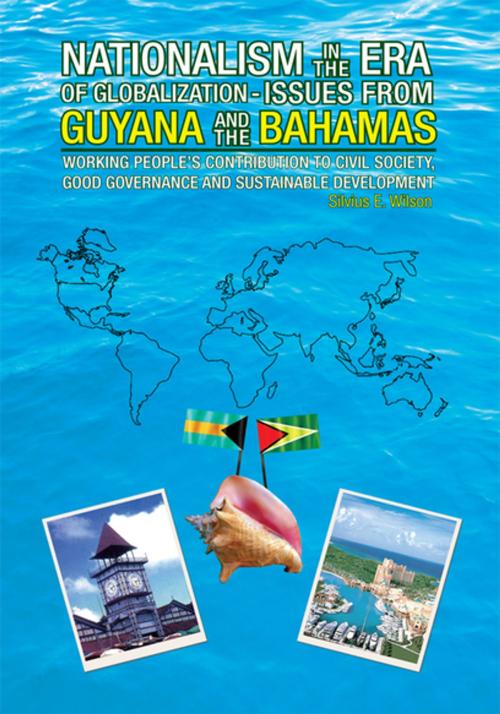Nationalism in the Era of Globalisation-Issues from Guyana and the Bahamas
Working People's Contribution to Civil Society, Good Governance and Sustainable Development
Nonfiction, Social & Cultural Studies, Political Science, Social Science| Author: | Silvius E. Wilson | ISBN: | 9781469116594 |
| Publisher: | Xlibris US | Publication: | February 26, 2008 |
| Imprint: | Xlibris US | Language: | English |
| Author: | Silvius E. Wilson |
| ISBN: | 9781469116594 |
| Publisher: | Xlibris US |
| Publication: | February 26, 2008 |
| Imprint: | Xlibris US |
| Language: | English |
This book came out of the need to highlight working peoples contribution to the process of self-organization and development in the former British Guiana-hereafter referred to as Guyana-and The Bahamas. Africans and other sections of the working people in these and other countries of the Caribbean, have succeeded, through their labour and transforming genius, in building communities, and produce crops and other commodities which aided metropolitan development. Guyanese workers dug canals, constructed dams and other necessary infrastructure which made the Atlantic coast inhabitable and crops and livestock flourished in a hostile, swampy and insect infested environment. In The Bahamas working people in New Providence and the Family Islands pioneered the fishing and boat-building industries and created the infrastructure for what became the leading tourist destination in the region. Organization at the local and grassroots level played an important role in the attainment of working peoples objectives in the region-wide nationalist movement, during the 1930s, through 50s, and gave rise to major developments such as the granting of adult suffrage, trade union legislation, opening up of Crown lands, majority rule and independence. The analysis will support the position that a reflection on the lessons of the pre-independence struggle as well as revisiting the spirit of collaboration and patriotism with which working people approached the objectives of political representation, job satisfaction and national identity, can provide relevant models to inform strategies to combat challenges which are brought about by globalisation. Issues relating to regional and international collaboration as well as national response to global developments in trade, production and social organisation, can benefit from a higher level of popularity and national awareness if citizens participation at the community and other levels of society is incorporated in the national discourse and response strategy. The title: Nationalism in the era of Globalisation. intends to draw attention to the new nationalism which is informing the new role of the nation state in which central governments are gradually assuming the role of facilitator in creating an enabling environment for the growth of the private sector as well as protect investors; guard against public sector inefficiency, corruption and waste; facilitate sound macroeconomic management that encourages economic growth and maintains price stability; in the process, embrace democratic values, respect diversity and open social spaces for peoples participation. Part of the role of government is also establish the structures and monitoring devices in order to avoid or reduce the severity of economic shocks in an era of increasing liberalization. One manifestation of this in the emergence of a complex terrain of bilateral and multilateral arrangements between and among nations of the Americas. Smaller states are seeking affiliation and membership within regional groupings such as NAFTA and MERCOSUR to secure the best trade deals and access to a wider market under the most favourable terms. Larger states such as Venezuela and Brazil are presenting their own vision of a Free Trade Area. Such a vision is based on sustainability, the eradication of poverty and empowerment of the masses. In this tradition some states in the Caribbean and South America have challenged the hegemony of the USA in a Washington-initiated model of the proposed Free Trade Area of the Americas [FTAA] and proposing instead a more progressive model based upon the recognition of several centres of influence within the grouping. These developments are addressed in the book within the context of the way in which national and regional response must be channeled to influence the course of events-including the role and guiding principles of the World Trade Organization [WTO], the United Nations [UN] and other Internationa
This book came out of the need to highlight working peoples contribution to the process of self-organization and development in the former British Guiana-hereafter referred to as Guyana-and The Bahamas. Africans and other sections of the working people in these and other countries of the Caribbean, have succeeded, through their labour and transforming genius, in building communities, and produce crops and other commodities which aided metropolitan development. Guyanese workers dug canals, constructed dams and other necessary infrastructure which made the Atlantic coast inhabitable and crops and livestock flourished in a hostile, swampy and insect infested environment. In The Bahamas working people in New Providence and the Family Islands pioneered the fishing and boat-building industries and created the infrastructure for what became the leading tourist destination in the region. Organization at the local and grassroots level played an important role in the attainment of working peoples objectives in the region-wide nationalist movement, during the 1930s, through 50s, and gave rise to major developments such as the granting of adult suffrage, trade union legislation, opening up of Crown lands, majority rule and independence. The analysis will support the position that a reflection on the lessons of the pre-independence struggle as well as revisiting the spirit of collaboration and patriotism with which working people approached the objectives of political representation, job satisfaction and national identity, can provide relevant models to inform strategies to combat challenges which are brought about by globalisation. Issues relating to regional and international collaboration as well as national response to global developments in trade, production and social organisation, can benefit from a higher level of popularity and national awareness if citizens participation at the community and other levels of society is incorporated in the national discourse and response strategy. The title: Nationalism in the era of Globalisation. intends to draw attention to the new nationalism which is informing the new role of the nation state in which central governments are gradually assuming the role of facilitator in creating an enabling environment for the growth of the private sector as well as protect investors; guard against public sector inefficiency, corruption and waste; facilitate sound macroeconomic management that encourages economic growth and maintains price stability; in the process, embrace democratic values, respect diversity and open social spaces for peoples participation. Part of the role of government is also establish the structures and monitoring devices in order to avoid or reduce the severity of economic shocks in an era of increasing liberalization. One manifestation of this in the emergence of a complex terrain of bilateral and multilateral arrangements between and among nations of the Americas. Smaller states are seeking affiliation and membership within regional groupings such as NAFTA and MERCOSUR to secure the best trade deals and access to a wider market under the most favourable terms. Larger states such as Venezuela and Brazil are presenting their own vision of a Free Trade Area. Such a vision is based on sustainability, the eradication of poverty and empowerment of the masses. In this tradition some states in the Caribbean and South America have challenged the hegemony of the USA in a Washington-initiated model of the proposed Free Trade Area of the Americas [FTAA] and proposing instead a more progressive model based upon the recognition of several centres of influence within the grouping. These developments are addressed in the book within the context of the way in which national and regional response must be channeled to influence the course of events-including the role and guiding principles of the World Trade Organization [WTO], the United Nations [UN] and other Internationa















